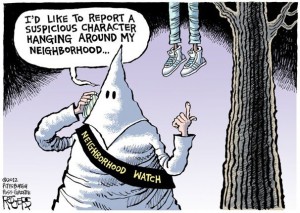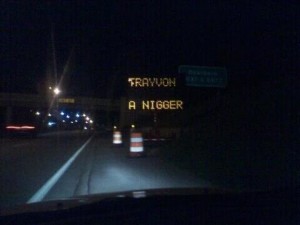George Zimmerman, Slave Patrols, and Black Victimization…
 George Zimmerman does not exist in a vacuum. It seems important for me to restate this fact at this time.
George Zimmerman does not exist in a vacuum. It seems important for me to restate this fact at this time.
As I predicted would happen, we have now entered the CSI or Law & Order phase of the Trayvon Martin killing. We are being subjected to a trial by media with reports by Nancy Grace about grand jury testimony, DNA evidence, and whether they will move the venue of any possible future trial. Unfortunately Law & Order Trayvon Martin won’t have a quick nor I predict satisfying ending for the public, the vast majority of whom will soon move on. After all, reality television can only hold the public’s attention (those who are even paying attention in the first place) for so long before people start to change the channel to watch something else.
Ultimately what will be lost in all of this is the memory of Trayvon Martin. However this episode will once again underscore the fact that most people do not actually care about antiblack violence in America. This is as it has always been; nothing new to see here. By virtue of our blackness, we are always perceived as disposable (even more so in the 21st century now that our labor is superfluous to the functioning of capitalism) and as “suspect.”
Larvester Gaither (2000) writes that the “adjective ‘suspicious’ expresses the historical and fundamental status of Africans in American society and partly explains American ambivalence toward the question of black victimization (p.192).” In other words, as Kanye West might say: “America does not care about black people.” It certainly does not care about black pain.
There is something more too. Our citizenship as black people is never taken for granted. It is consistently under assault. Black people are in a perpetual struggle in America not to be disenfranchised. For example, currently the right is pushing new voter ID laws across the country which are specifically intended to suppress black votes. People have called Arizona’s SB1070 the “papers please” law. It’s an apt characterization. However it should be pointed out that black people in America (including our current President) have been and continue to be asked to produce “our papers” regularly and usually there is no “please” attached to the demand.In the 18th century, slave patterollers were empowered to demand documentation from any black person they came across as proof that they were actually “free.” W. Marvin Dulaney writes about slave patrols in his book Black Police in America (1996):
“By the middle of the eighteenth century, every southern colony had a slave patrol. Although in some communities all white males were required to serve some time as patterollers, their ranks were usually filled with poor whites. The patrols were authorized to stop, search, whip, maim, and even kill any African slave caught off the plantation without a pass, engaged in illegal activities, or running away. The patterollers policed specific geographic areas in southern communities called “beats.” Paramilitary in nature, the slave patrol often cooperated with the militia in the southern colonies to prevent and suppress slave insurrections. To facilitate the rapid mobilization of the patrol and to ensure that every white man supported its activities in emergencies, colonial governments granted all whites the authority to detain, whip, and even kill slaves suspected of illegal activities or conspiracies. The colonial slave patrol exercised awesome powers which were often abused [emphasis mine] (p.2).”
Does this sound eerily familiar? If not, it should. I repeat: George Zimmerman does not exist in a historical vacuum. He felt it perfectly within his rights to demand to know what Trayvon was doing in his gated community. [Please don’t mention the fact that Zimmerman is half Peruvian to me as a way to suggest that he cannot be an adherent of white supremacist ideology. We all swim in and internalize the toxic soup of American racism on a daily basis.] Political scientist Robert Gooding-Williams, writing in the New York Times, makes an explicit connection between Zimmerman and slave patterollers:
If it seems a stretch, finally, to paint Zimmerman in the image of the slave catchers of yesteryear, recall that he himself invited the comparison when, while stalking the African-American teenager against the advice of a 911 dispatcher, he complained, using an expletive to refer to Trayvon, that they “always get away.”
Fast forward to 2012, our President is asked to produce his papers on an almost daily basis, when stopped for driving while black we are asked for our licenses and registration, standing on the street corner minding our business we are told to show identification, and walking back from the store with ice tea and Skittles in hand we are questioned about where we are going and asked to prove that we belong in this particular neighborhood. It is within this context of blacks as ‘perpetually criminally suspect’ that George Zimmerman felt empowered to act as an antiblack vigilante. He had historical precedent on his side and he must have known this.

